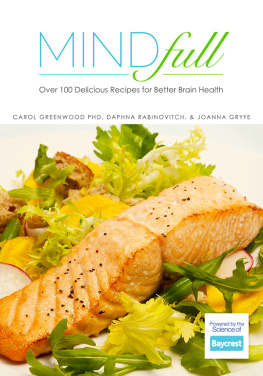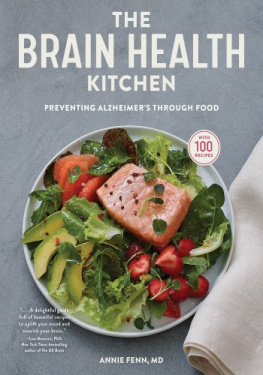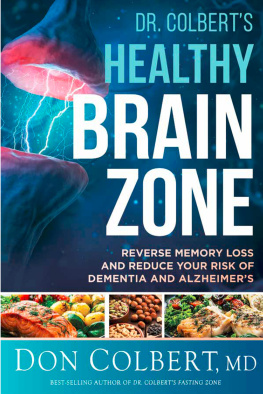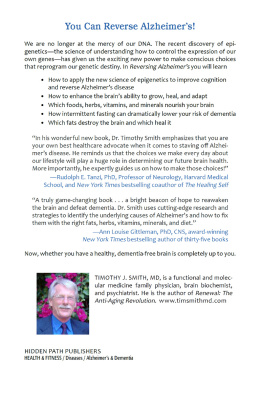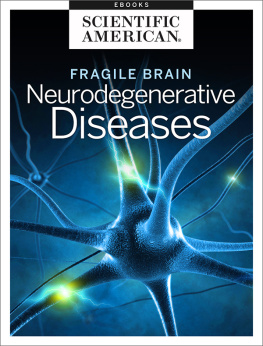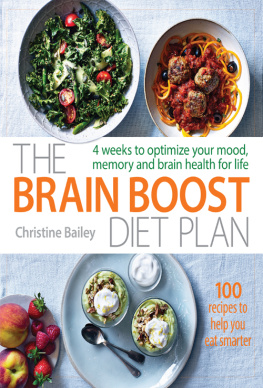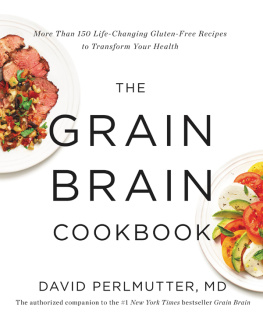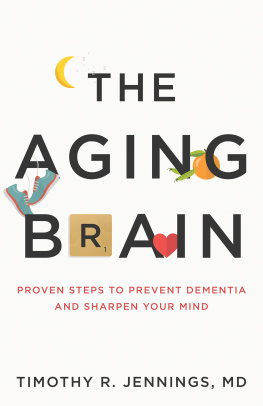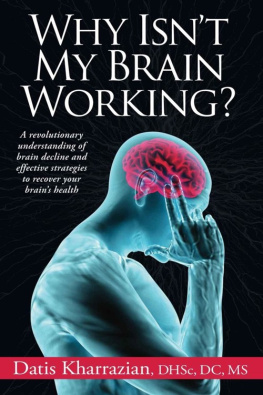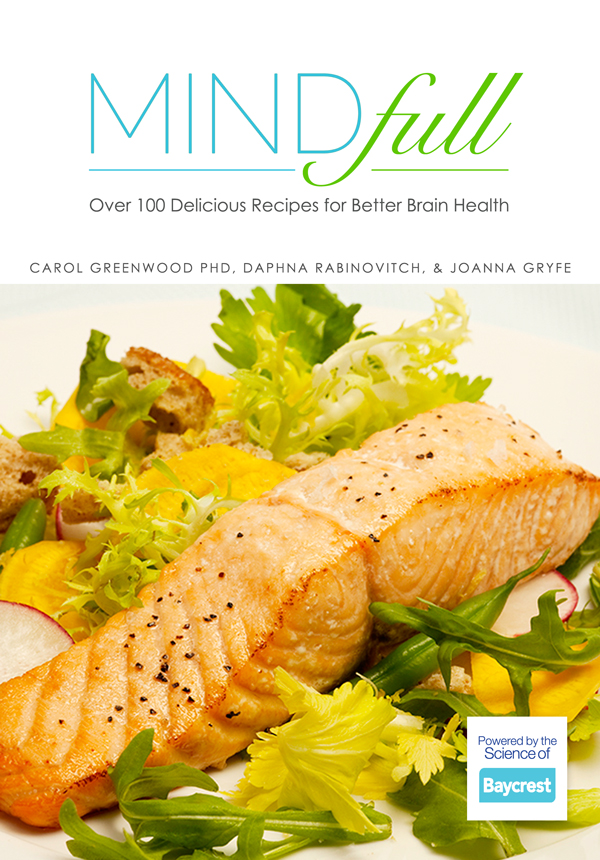
LETTER OF INTRODUCTION
Lasting memories often revolve around food: your grandmother's perfume of garlic, the way chocolate stained your mother's hands, laughing over late-night tubs of ice cream with your sisters. So we thought it fitting that food be a driving force in the battle to save the memories and minds of women and their loved ones everywhere.
Sixty per cent of Alzheimer's diagnoses are attributed to lifestyle choices; poor eating habits and a lack of physical and intellectual stimulation are stronger drivers for dementia than genetics alone.
While scientists have researched the nutrition of brain health for years, this information has never been handed over to the home cook. Women of Baycrest, a dynamic volunteer organization focused on brain-health research and healthy aging decided to create a cookbook that would fill the gap. And that's where we came in.
A leading Senior Scientist and Professor of Nutrition and Brain Health with our Rotman Research Institute one of the top 5 ranked cognitive neuroscience institutes in the world, a professional food writer, baker and recipe developer as well as a curious foodie heeded the call to bake, roast, sift, and saut a delicious translation of the science everyone wants to understand. We are forever indebted to the celebrated cooks, chefs and host of other food professionals across the country who generously contributed to this project. The product of this culinary collaboration is Mindfull a cookbook that provides food for your table and even more food for thought.
Our hope is that this book will be a valuable tool for sustaining a brain-healthy diet. From dining room dinners to portable snacks, every page bursts with a fresh approach to cooking designed to take you from morning to night.
From the bottom of our hearts, we thank you for including Mindfull in your cookbook collection, and in doing so, supporting Baycrest, a leader in developing and providing innovations in aging and brain health. It is our hope that each morsel and mouthful advances brain-health science and takes you one meal closer to sharing more meals with your family and friends for a long, long time.
Here's to many healthy helpings,
Carol, Daphna, Joanna and the Women of Baycrest.
A MESSAGE FROM BAYCREST
For nearly a century, Baycrest has continually adapted to changing needs to remain at the forefront of seniors' care and brain research. Today we are recognized as the global leader in innovative care delivery and cutting-edge cognitive neuroscience. Affiliated with the University of Toronto, Baycrest is among the world's most respected academic health sciences centres focused on the needs of seniors and our aging population.
We provide care and service to approximately 2,500 people a day through a unique continuum of care from wellness programs, residential housing, and outpatient clinics to a 472-bed nursing home and a 300-bed complex continuing care hospital facility with an acute care unit.
Baycrest is leading the charge to reshape the future of aging today. The Rotman Research Institute is home to world-renowned researchers, encompassing a broad spectrum of expertise ranging from behavioural neurology to cognitive psychology to neuropharmacology.
At Baycrest, we create, evaluate and transfer new practices, knowledge and products from our health sciences platform and bring them to market to provide a system-wide impact on care delivery, quality of life and health and wellness for an aging population.
Annually, nearly 1,000 students, trainees and other practitioners from 24 universities and colleges have a unique opportunity to experience the delivery of high quality care alongside leading experts on one of the world's most comprehensive campuses of care focused on aging and care of older adults.
Bringing Mindfull into your home is one more way that we are changing what it means to age.
To learn more about Baycrests activities, visit our website: www.baycrest.org
MINDFULL COOKBOOK:
THE SCIENCE OF BRAIN HEALTH
BY DR. CAROL E. GREENWOOD
In the last 20 years, we have seen a burst of new information which has fundamentally changed our thinking about the human brain. No longer is the brain considered a static' organ which ceases to grow beyond adolescence. Instead, we now know it has a wonderful capacity to refresh, to renew and to repair itself and create new brain cells and new connections throughout a person's life.
Today, what we refer to as "successful aging" embraces this capacity of the brain to grow and reneweven in the face of the challenges of aging. In fact, we now know that our lifestyle choices can have a huge impact on the degree to which we retain our brain's capacity. The health and lifestyle choices we make as early as age 40 can determine our brain's health and function much later in life. So it is never too early to adopt a healthy lifestyle (and never too late!) to promote successful aging, not just for our bodies but also for our brains.
In the next few pages, you will discover what it means to pursue a "brain healthy" lifestyle. Later, you will discover how the food choices you make can play an important role as well. We'll review the current scientific evidence on the best "brain foods", discuss the many myths and misconceptions about the brain, and show you what types of changes to make for your own brain-healthy diet.
Rest assured; all the recipes in this book are both easy to prepare and designed to be consistent with the science behind brain health. Think of them as "stepping stones" on a gradual path towards a diet which increases your ability to strengthen your memory, mental clarity and brain health. All of the information in this cookbook is based on sound science. Wherever possible, we also provide you with helpful links to credible web sites if you choose to further your reading in specific areas.
A Healthy Body Leads to a Healthy Brain
In addition to eating a brain-healthy diet, there are many things you can do during the day that boost your cognitive function. This information opens each chapter and is linked to specific times of day or meals. Also emphasized are strategies to help us maintain our body weights. That's because the brain is intimately involved in controlling our feelings of hunger and satiety. As you may know, obesity-related disorders can damage the health of your brain. Maintaining a healthy body weight is an important part of maintaining a healthy brain.
So the first thing we need to focus on when talking about brain health is the overall health of our bodies. Many chronic disorders including high blood pressure, about what you can do to promote healthy brain aging:
Heads Up for a Healthier Brain Advice from the Alzheimer Society of Canada
Challenge Yourself Research suggests that mental stimulation enhances brain activity and may help you maintain your cognitive function throughout life. This can take many different forms, such as playing mind-challenging games (e.g. chess, crossword puzzles, Sudoku), learning a new language or musical instrument, and staying engaged in hobbies. While playing computer games may help with challenging you cognitively, many computer games have not been scientifically tested for their ability to improve brain function or to help retain cognitive function over time. So if you select gaming' as a means of supporting or enhancing your cognitive function, be certain there is scientific evidence supporting any claim.
Be Socially Active People who regularly interact with others maintain their brain function better than those who do not. There are many ways to maintain social connectedness keeping in touch with old friends, volunteering, joining groups, even just saying hello and striking up a conversation with people you meet in public or while shopping.
Next page
